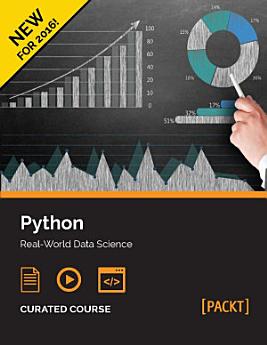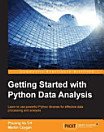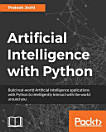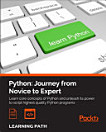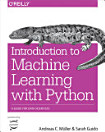Python: Real-World Data Science
eBook 정보
Entry-level analysts who want to enter in the data science world will find this course very useful to get themselves acquainted with Python's data science capabilities for doing real-world data analysis.
What You Will LearnInstall and setup PythonImplement objects in Python by creating classes and defining methodsGet acquainted with NumPy to use it with arrays and array-oriented computing in data analysisCreate effective visualizations for presenting your data using MatplotlibProcess and analyze data using the time series capabilities of pandasInteract with different kind of database systems, such as file, disk format, Mongo, and RedisApply data mining concepts to real-world problemsCompute on big data, including real-time data from the InternetExplore how to use different machine learning models to ask different questions of your dataIn DetailThe Python: Real-World Data Science course will take you on a journey to become an efficient data science practitioner by thoroughly understanding the key concepts of Python. This learning path is divided into four modules and each module are a mini course in their own right, and as you complete each one, you'll have gained key skills and be ready for the material in the next module.
The course begins with getting your Python fundamentals nailed down. After getting familiar with Python core concepts, it's time that you dive into the field of data science. In the second module, you'll learn how to perform data analysis using Python in a practical and example-driven way. The third module will teach you how to design and develop data mining applications using a variety of datasets, starting with basic classification and affinity analysis to more complex data types including text, images, and graphs. Machine learning and predictive analytics have become the most important approaches to uncover data gold mines. In the final module, we'll discuss the necessary details regarding machine learning concepts, offering intuitive yet informative explanations on how machine learning algorithms work, how to use them, and most importantly, how to avoid the common pitfalls.
Style and approachThis course includes all the resources that will help you jump into the data science field with Python and learn how to make sense of data. The aim is to create a smooth learning path that will teach you how to get started with powerful Python libraries and perform various data science techniques in depth.
평점 및 리뷰
저자 정보
Fabrizio Romano was born in Italy in 1975. He holds a master's degree in computer science engineering from the University of Padova. He is also a certified Scrum master. Before Python, he has worked with several other languages, such as C/C++, Java, PHP, and C#. In 2011, he moved to London and started working as a Python developer for Glasses Direct, one of Europe's leading online prescription glasses retailers. He then worked as a senior Python developer for TBG (now Sprinklr), one of the world's leading companies in social media advertising. At TBG, he and his team collaborated with Facebook and Twitter. They were the first in the world to get access to the Twitter advertising API. He wrote the code that published the first geo-narrowcasted promoted tweet in the world using the API. He currently works as a senior platform developer at Student.com, a company that is revolutionizing the way international students find their perfect home all around the world. He has delivered talks on Teaching Python and TDD with Python at the last two editions of EuroPython and at Skillsmatter in London.
Phuong Vo.T.H has a MSc degree in computer science, which is related to machine learning. After graduation, she continued to work in some companies as a data scientist. She has experience in analyzing users' behavior and building recommendation systems based on users' web histories. She loves to read machine learning and mathematics algorithm books, as well as data analysis articles.
Martin Czygan studied German literature and computer science in Leipzig, Germany. He has been working as a software engineer for more than 10 years. For the past eight years, he has been diving into Python, and is still enjoying it. In recent years, he has been helping clients to build data processing pipelines and search and analytics systems. His consultancy can be found at http://www.xvfz.net.
